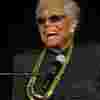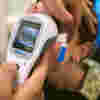Tone of voice
Our tone of voice informs how we sound and the emotions we evoke. It's as important as the visual way we present ourselves to the world.

What is a tone of voice?
Our tone describes how we speak, how we write, the words we use and our emotional tone.
In this guide we'll explain:
Why tone matters
How we sound is as important as how we look in the way we present our charity to the world.
Our voice is an expression of our personality and who we are; we want people to recognise us and engage in meaningful conversations.
Many within the vision loss community will experience us more aurally than they do visually.
We want to speak with a unified voice that is consistent and recognisable, which people can trust.
Our tone is an extension of:
- Our vision (our why)
- Our mission (what we do, and how we do it)
- Values (the principles that determine who we are)
-
Narrative: The story we share to express our vision, mission and values.
-
Personality: How we express ourselves.
Below we outline who we are, and what it means in terms of our tone.

I've learned that people will forget what you said, people will forget what you did, but people will never forget how you made them feel.
Who we are
Vision (our why): Save Sight. Change Lives.
Our mission (what we do): We fund the brilliant minds and bright ideas putting change in sight for everyone impacted by vision loss.
Our mission (how we do it):
We invest in sustainable projects that deliver equity and back science that brings prevention, treatment, and cures within reach.
We know what it means to be blind and have vision loss, and we have the experience, expertise, and connections to deliver change.
Our values: Together, we are bold, tenacious, informed, optimistic.
Our values guide our messaging, ensuring that what we say and how we say it remains authentic and true to our core beliefs.
Click on the values, below, for a description and tips on how to apply our voice.
-
Together
We are a community of colleagues. So, if we face challenges, we link arms and work together to find a solution.
Our collaborative spirit extends across and beyond our sector to drive impact through partnership.
We convene experts to collaborate in our vision to 'Save sight. Change lives.'
How does this impact the way we speak?
Use ‘we, our, us’.
- We show our spirit of togetherness through a sense of inclusion.
- We write and speak with a unified voice that reflects a collective mission and vision.
- We are of and for people who are blind and vision impaired; we work with rather than doing ‘to’.
Amplify voices:
- We seek opportunities to quote directly from those we support.
- We do so with care, always seeking consent and writing with empathy, checking that individuals are happy with the words we choose.
Share generously:
- We’re generous in spotlighting partners, supporters and funders.
- We share impact stories and celebrate their achievements.
- We share their content generously (including social media).
Write how you’d speak:
- We avoid using jargon and simplify language.
- If you don’t understand something, always feel empowered to challenge it.
- Accessibility tool Read Aloud is a great way to hear your content and check whether it’s simple and engaging.
-
Bold
We fund brilliant minds and bright ideas to put change in sight.
We innovate across everything we do.
Creative and courageous, we’re always seeking opportunities for growth.
We innovate and adopt technology, tools and processes to deliver change at pace.
The work we fund ignites research and accelerates treatments and cures.
How does this impact the way we speak?
We take ownership and are confident:
- The science and scientists we fund are world-class, and we know we can and will prevent, treat, and cure vision loss. So, be bold and use phrases like ‘we will’.
- We fund brilliant scientific minds, so even if hypotheses are disproved, we learn and are bold enough to try again.
- Likewise, we don’t ‘hope’ that the projects we fund deliver change; we believe they will.
- The money we raise enables us to fund research and projects in the heart of communities, and we can be confident in asking people to donate.
Through our communications we boldly showcase achievements as well as champion needs.
- Everything we do has an impact
- Don’t waste words; be concise and get to the point.
- When speaking about impact boldly, own our contributions.
Not sure of your writing? Try this website and see how your readability stacks up.
-
Tenacious
People who are blind or vision impaired are impatient for change, and so are we.
We’re dynamic but not at the cost of longevity, so we won’t stop until our vision (Save Sight. Change Lives) becomes a reality.
Challenging the status quo will accelerate our success.
How does this impact the way we speak?
• We take risks, try new things, and aren’t afraid to push boundaries when it comes to language, either.
• We use active language to show our can-do spirit. If you’re unsure if a sentence is active, add ‘by monkeys’ to the end of any phrase you think might be passive. If it makes sense, it’s passive; if not, active.
• We dig deep. We’re optimistic about change, but it takes time.
• Give examples of where we’ve had success and what we learned when we didn’t.
• We show our determination to succeed: we demonstrate this tenacity through researchers driven to prevent, treat and cure vision loss, the people who run marathons for us, and family funds who support us.
• Our tenacious nature is reflected in our language, giving a sense of determination, strength and compassion – we use phrases such as we will, rather than we could or might.
-
Informed
We are driven by expertise, and we are experts by virtue of our lived experience.
We use our collective expertise to guide our actions and decisions.
We’re impact-driven – and we actively share our insights to catalyse change.
How does this impact the way we speak?
• We’re an evidence-driven organisation, so no opinion without fact. For example:
o We can say that eye research is underfunded compared to other disease areas; we back that up with statistics.
o Likewise, we can say that people who are blind and vision impaired are more likely to experience loneliness and use figures from our commissioned research.
• We listen to people who are blind and vision impaired, and their experiences inform our voice.
o We are for and of the community and do ‘with’ not ‘to’; use ‘we’.
• We check our information with trusted experts: our own grants team, RGAP and SGAP members, and the scientific community to ensure that what we’re saying is accurate. We follow the process, so we don’t slip up.
• Our writing is empathetic, knowledgeable. We avoid clichés and lean into unique lived experiences:
o Avoid generalisations and use real-world examples.
o Don’t make assumptions about others’ experiences.
-
Optimistic
We believe we will deliver a brighter future for blind and vision impaired people and their families.
We have the evidence and skills to support this belief and can demonstrate impact, which inspires others.
How does this impact the way we speak?
- We take an optimistic and proactive view on the world and show that through language.
- Our belief is grounded in evidence; the work we're funding in optogenetics, for example, holds great promise.
- We know we will ignite scientific research to deliver treatments and cures for eye disease. The projects we fund at the heart of communities deliver positive change.
- We reflect on the projects we fund through the sensitively written and empowering stories we tell, so it's important we zoom in on what we have done and the difference it has made and take ownership of our achievements and of the people we fund.
Brand Personality
Our personality influences the way that we speak, write and present ourselves to the world.
We are "Informed Optimists".
- Our personality reflects our commitment to being data- and research-driven in everything we do.
- We're optimistic about the future. Based on research we've funded, we know that better understanding, diagnosis, prevention and treatment of eye disease is within reach.
- Research we're funding has the potential to reverse vision loss.
- Being informed and being optimistic need to be balanced; one doesn't work without the other.
- Optimism alone may mean we're putting our money in the wrong place.
- We fund early stage research but we're informed about it and de-risk by passing all our grant-making activities through robust governance.
-
Why tone matters
-
Who we are
-
Voice and values
-
Personality
- Why tone matters
- Who we are
- Voice and values
- Personality
